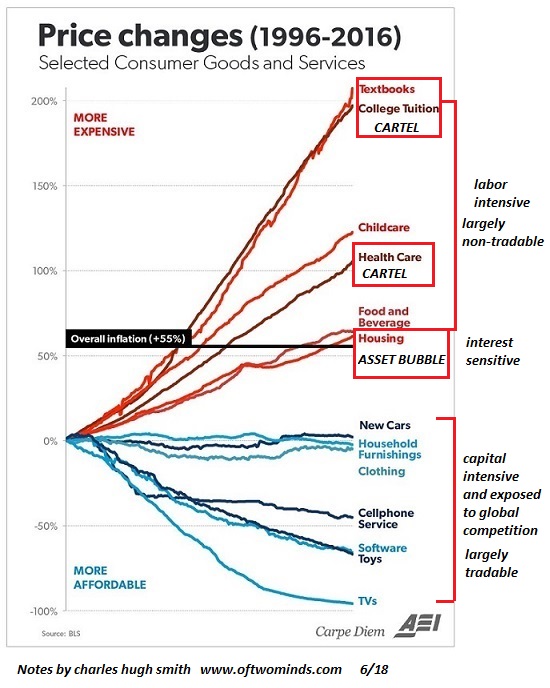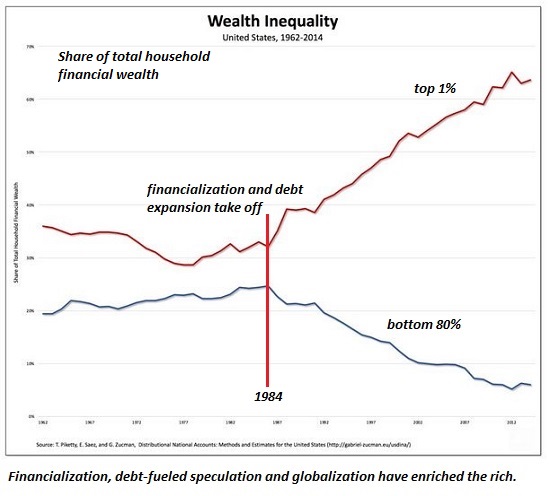Our society has a legal structure of self-rule and ownership of capital, but in reality it is a Neofeudal Oligarchy.
Now that the pandemic is over and the economy is roaring again--so the stock market says--we're heading straight back up into the good old days of 2019. Nothing to worry about, we've recovered the trajectory of higher and higher, better every day in every way.
Everything's great except the fatal rot at the heart of the U.S. economy hasn't even been acknowledged, much less addressed: every sector of the economy is nothing but one form of neofeudal extortion or another.
Let's spin the time machine back to the late Middle Ages, at the height of feudalism, and imagine we're trying to get a boatload of goods to the nearest city to sell. As we drift down the river, we're constantly being stopped and charged a fee for transiting one small fiefdom after another. When we finally reach the city, there's an entry fee for bringing our goods to market.
Note that none of these fees were payments for improvements to transport or for services rendered; they were simply extortion. This was the economic structure of feudalism: petty fiefdoms levied extortionate fees that funded the lifestyles of nobility.
This is why I have long called America's economy neofeudal: we pay ever higher fees for services that are degrading, not improving. This is the essence of extortion: we don't get any improvement in goods and services for the extra money we're forced to pay.
Consider higher education: costs are soaring while the value of the "product"--a college diploma--declines. What extra value are students receiving for the doubling of tuition and fees? The short answer is "none." College diplomas are in over-supply, and studies have found that a majority of students learn remarkably little of value in college.
As I explain in my book The Nearly Free University and the Emerging Economy, the solution is to accredit the student, not the institution. If the student learned very little, he/she doesn't get credentialed.
Were students to have access to the best classroom lectures online (nearly free), and on-the-job apprenticeships in the workplace, (nearly free or perhaps even paid), learning would be significantly improved and costs reduced by 80% to 90%.
In this structure, there's no need for costly campuses or administration; the entire structure of higher education could be largely automated with software, except for the workplace apprenticeships which focus on case studies and real-world projects that are creating value in the here and now.
Consider healthcare: has the quality of healthcare doubled along with costs? Are Americans significantly healthier as the costs of healthcare have tripled? The aggregate health of Americans has arguably declined, while the stresses placed on frontline care providers by the ever-heavier burdens of compliance and paperwork have increased.
What about the $200 hammers and $300 million F-35 aircraft of the defense industry? Once again, as costs have soared, the quality and effectiveness of the products being supplied has arguable declined.
How about state and local government services? Are they improving as taxes and junk fees rise? Once again, government services are often declining in quality as taxes and fees increase by leaps and bounds.
In sector after sector, the quality of the goods and services has declined while costs have soared. This is the acme of neofeudalism: insiders and the New Nobility are skimming fortunes as prices skyrocket and the quality of the goods and services provided plummet.
Look at the cost increases in higher education, healthcare and childcare and ask yourself if the quality of those services have risen in lockstep with price increases.
This is nothing but neofeudal extortion. The cartels raise prices and we're forced to pay them, just as feudal commoners were forced to pay.
But extortion isn't the only feature of neofeudalism that is leading to collapse. Just as important is the slow erosion of commoners' self-rule and ownership of meaningful, productive capital.
This dynamic is explored in depth in The Inheritance of Rome: Illuminating the Dark Ages 400-1000.
This gradual, almost imperceptible erosion is the essence of neofeudalism, a process of transferring political and economic power from commoners to a new Financial Aristocracy/Nobility.
If we examine the "wealth" of the middle class/working class (however you define them, the defining characteristic of both is the reliance on labor for income, as opposed to living off the income earned by capital), we find the primary capital asset is the family home, which as I have explained many times, is unproductive--in essence, a form of consumption rather than a source of income.
In a globalized, financialized economy, the only capital worth owning is mobile capital, capital that can be shifted by a keystroke to avoid devaluation or earn a a higher return.
Housing and pensions are "stranded capital," forms of capital that are not mobile unless they are liquidated before crises or expropriations occur.
I am also struck by the ever-rising barriers to starting or even operating small businesses, a core form of capital, as enterprises generate income and (potentially) capital gains. (The pandemic has only increased barriers that were already high.)
The capital and managerial expertise required to launch and grow a legal enterprise is significant, which is at least partly why a nation of self-employed farmers, shopkeepers, artisans and traders is now a nation of employees of government and large corporations.
What sort of capital can be acquired by the average commoner now? Enough to match the wealth and political power of financial Nobility?
As for political influence: a recent study found that voters had very little power in the U.S., which is effectively an oligarchy: Testing Theories of American Politics: Elites, Interest Groups, and Average Citizens.
Summary: "The U.S. government does not represent the interests of the majority of the country's citizens, but is instead ruled by those of the rich and powerful, a new study from Princeton and Northwestern universities has concluded."
Neofeudalism is not a re-run of feudalism. It's a new and improved, state-corporate version of indentured servitude. The process of devolving to feudalism required the erosion of peasants' rights to own productive assets, which in an agrarian economy meant ownership of land.
Ownership of land was replaced with various obligations to the local feudal lord or monastery-- free labor for time periods ranging from a few days to months; a share of one's grain harvest, and so on.
The other key dynamic of feudalism was the removal of the peasantry from the public sphere. In the pre-feudal era (for example, the reign of Charlemagne), peasants could still attend public councils and make their voices heard, and there was a rough system of justice in which peasants could petition authorities for redress.
From the capitalist perspective, feudalism restricted serfs' access to cash markets where they could sell their labor or harvests. The key feature of capitalism isn't just markets-- it's unrestricted ownership of productive assets--land, tools, workshops, and the social capital of skills, networks, trading associations, guilds, etc.
Our system is Neofeudal because the non-elites have no real voice in the public sphere, and ownership of productive capital is indirectly suppressed by the state-corporate duopoly.
Our society has a legal structure of self-rule and ownership of capital, but in reality it is a Neofeudal Oligarchy. The decline is visible, and so is the trajectory to collapse.
I discuss these dynamics in greater depth in my books:

We got your neofeudal wealth inequality right here:


Recent Podcasts:
Audiobook edition now available:
Will You Be Richer or Poorer?: Profit, Power, and AI in a Traumatized World ($13)
(Kindle $6.95, print $11.95) Read the first section for free (PDF).
Will You Be Richer or Poorer?: Profit, Power, and AI in a Traumatized World ($13)
(Kindle $6.95, print $11.95) Read the first section for free (PDF).
Pathfinding our Destiny: Preventing the Final Fall of Our Democratic Republic ($6.95 (Kindle), $12 (print), $13.08 ( audiobook): Read the first section for free (PDF).
The Adventures of the Consulting Philosopher: The Disappearance of Drake $1.29 (Kindle), $8.95 (print); read the first chapters for free (PDF)
Money and Work Unchained $6.95 (Kindle), $15 (print) Read the first section for free (PDF).
If you found value in this content, please join me in seeking solutions by becoming a $1/month patron of my work via patreon.com.
If you found value in this content, please join me in seeking solutions by becoming a $1/month patron of my work via patreon.com.
NOTE: Contributions/subscriptions are acknowledged in the order received. Your name and email remain confidential and will not be given to any other individual, company or agency.
Thank you, Christopher D. ($50), for your superbly generous contribution to this site -- I am greatly honored by your support and readership. | Thank you, Randall G ($50), for your monstrously generous contribution to this site -- I am greatly honored by your support and readership. |
